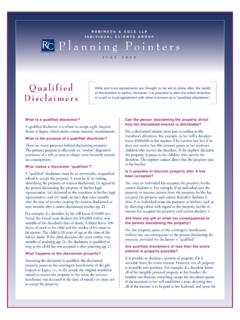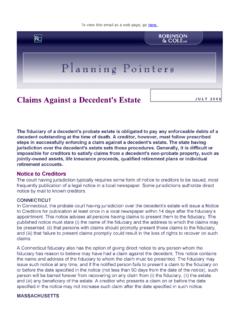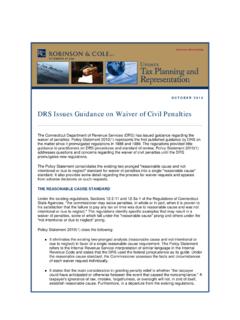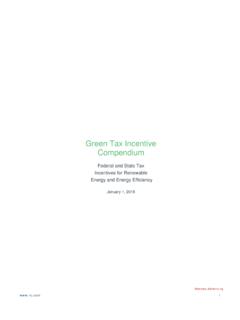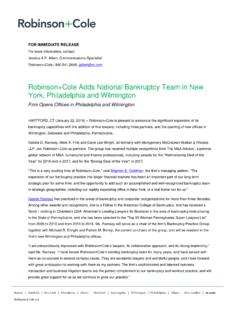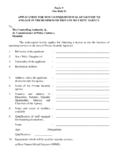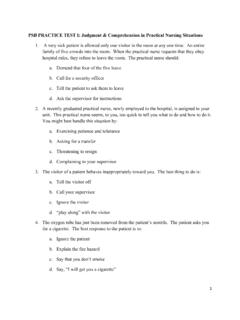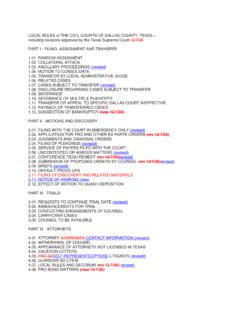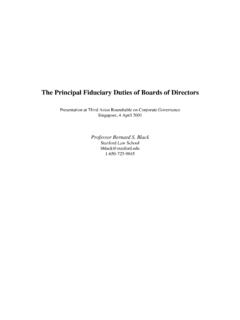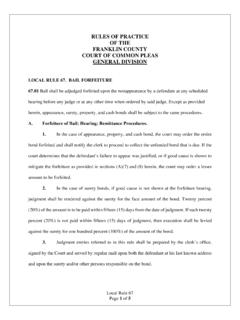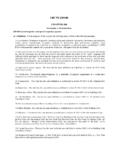Transcription of The Business Judgment Rule and the Entire …
1 The Business Judgment Rule and the Entire fairness DoctrineExecutive SummaryCourts rely on two standards of review for assessing disputed Business transactions. The Business judg-ment rule prevents courts from second-guessing the decisions of independent and disinterested directors who have acted with due care by placing the focus on the reasonableness of a board s decision-making pro-cess. The Business Judgment rule is a default rule where the plaintiff has the burden of proof. The Entire fairness standard is triggered where a majority of the directors approving the transaction are interested or where a majority stockholder stands on both sides of the transaction. Once the Entire fairness standard is triggered, the corporate board has the burden to demonstrate that the transaction is inherently fair to the stockholders by demonstrating both fair dealing ( , process) and fair price ( , substance).
2 Overview of the Business Judgment RuleThe Business Judgment rule is a rule of law that insulates an officer or director of a corporation from li-ability for a Business decision made in good faith if he is not interested in the subject of the Business [deci-sion], is informed with respect to the subject of the Business [decision] to the extent he reasonably believes to be appropriate under the circumstances, and rationally believes that the Business [decision] is in the best interests of the corporation. 1 Thus, the court squarely places the initial burden of proof on the plain-tiff in challenging an officer or director s decision. If the stockholder fails to meet the evidentiary burden, the Business Judgment rule attaches to protect officers and directors and the decisions they Business Judgment rule is the first line of defense and often the best protection a company has in an action brought against a director for breach of fiduciary duties.
3 Directors or officers owe to the corpora-tion a duty of care to act on an informed basis, an uncompromising duty of loyalty to the corporations on whose boards they serve, and a duty of good Violation of any of these duties can carry hefty penal-ties. The court may order the offending fiduciary to pay restitution or impose punitive damages to deter future violations, in addition to any reputational damages incurred. In a recent 2012 case, the Delaware Supreme Court affirmed a Judgment of approximately $2 billion in addition to over $300 million in legal fees for plaintiff s counsel for breach of a fiduciary duty Paramount to the outcome is the standard under which a director s actions are reviewed. As the Delaware Supreme Court has recognized, the choice of the applicable test to judge director action is critically important because it often determines the out-come of the Business Judgment rule is rooted in a 100-year history in which the courts generally avoid substituting the Judgment of a judge for that of the It is the essence of the Business Judgment rule that a court will not apply 20/20 hindsight to second guess a board s decision, except in rare cases [where] a trans-action may be so egregious on its face that board approval cannot meet the test of Business Judgment .
4 7 Irrationality is the outer limit of the Business Judgment A court will not substitute its own notion of what is or is not a sound Business Judgment , and the approval of a transaction by a majority of indepen-dent and disinterested directors almost always bolsters [the] presumption that the Business Judgment rule attaches to transactions approved by a board of directors that are later attacked on grounds of lack of due care. 9 The Business Judgment rule has been stated as a presumption not only by the courts applying Delaware law but also by courts applying the laws of a comfortable majority of other Business Judgment Rule and the Entire fairness DoctrineStructurally, the Business Judgment rule has two components. The first component immunizes directors from personal liability if they act in accordance with its requirements while the second component insu-lates the court from intervening in management decisions made by the directors.
5 The protection that the Business Judgment rule affords is generous. It is well established that the mere fact that a company takes on Business risk and suffers losses even catastrophic losses does not evidence misconduct, and with-out more, is not a basis for personal director liability. 10 Special Pleading RequirementsIt is the case in Delaware that courts routinely dismiss complaints pursuant to Rule 12(b)(6) based on the Business Judgment rule. 11 The presumption of the Business Judgment rule attaches ab initio, and to sur-vive a motion to dismiss, a plaintiff must allege well-pleaded facts to overcome the presumption. However, a minority of courts have held that the Business Judgment rule is an affirmative defense that cannot be considered in the context of a motion to the PresumptionIn the case that the party challenging the board s decision is able to allege and prove facts sufficient to overcome the Business Judgment rule presumption, the burden then shifts to the director defendants to demonstrate that the challenged act or transaction was entirely fair to the corporation and its fairness Standard Where the Presumption Is OvercomeFairness becomes an issue only if the presumption of the Business Judgment rule is defeated.
6 13 The fairness test is designed to test whether a self-dealing transaction should be given deference or set aside in equity. The court s decision does not turn on whether the interested directors acted in good faith but whether, in the absence of arms-length bargaining, the transaction, viewed objectively, is fair and In other words, the fairness requirement examines whether the transaction is entirely fair to the Thus, the tension and complexity in corporate governance between deference to directors decisions and the scope of judicial review is underscored by both the shifting burdens of proof within the Business Judgment rule and dynamic judicial standards, depending on the nature of the transaction or spe-cial circumstances of the Entire fairness DoctrineIf the party challenging the board s decision is able to allege and prove that those involved in the decision-making process lack independence or otherwise breached any of their fiduciary duties, then the Business Judgment rule s presumption is overcome and the court will apply the Entire fairness doctrine.
7 As a result, the burden shifts to the corporation to prove that both the process that was followed and the price that was achieved are fair to the stockholders of the v. Moffet succinctly details the two-step process whereby this protection is lost. First, when a majority of the board of directors is the ultimate decision maker and a majority of the board is interested in the transaction, the presumption of the Business Judgment rule is rebutted. 17 Second, when the pre-sumption of the Business Judgment rule has been rebutted, the Entire fairness rule is implicated and defen-dants bear the burden of proof. 18 The Entire fairness standard is a strict standard meant to apply to Business Judgment Rule and the Entire fairness Doctrinetransactions that have conflicts in which the majority of the board is interested or stands to receive a ma-terial benefit, a director has financial incentives adverse to the company, or a conflicted director or stock-holder controls or dominates the board as a whole.
8 19 Directors are found to be interested if they appear on both sides of a transaction or expect to derive any personal financial benefit from it in the sense of self-dealing, as opposed to a benefit which devolves upon the corporation or all stockholders generally. 20 The Entire fairness test is the most exacting standard, which requires a judicial determination of whether a transaction is entirely fair to stockholders. The burden of proving that a challenged transaction is entirely fair falls on the defendants, who must show that the transaction was approved either by a special commit-tee of independent directors or by an informed vote of the majority of the disinterested stockholders. In addition, when the board of a target corporation does not consist of a majority of disinterested directors, the Entire fairness test applies, and the challenged actions will be upheld only if they are fair to the stock-holders.
9 When the Entire fairness test applies, a transaction must be fair as to both process and Fair deal-ing encompasses questions of process, including how the transaction is timed, initiated, structured, nego-tiated, and disclosed and how the approvals of the directors and the stockholders are obtained. Fair price relates to the economic and financial terms of the transaction, including any relevant factors that affect the intrinsic or inherent value of a company s stock, such as the market value and assets of the company, a pro forma analysis and other valuation metrics, and a fairness opinion. The fair price and fair dealing components are not viewed in isolation but rather in conjunction. Entire fairness requires the court to strictly scrutinize all aspects of a transaction to ensure fairness , and, as such, fairness as to one prong will not necessarily sterilize or immunize a defendant from liability.
10 22 From a procedural perspective, the breach of any one of the board s fiduciary duties is enough to shift the bur-den of proof to demonstrate Entire fairness . 23 Thus, where the pricing terms of a transaction that is the product of an unfair process cannot be justified to reliable markets or by comparison to substantial and dependable precedent transactions, the burden of persuading the court of the fairness of the terms will be exceptionally difficult. 24 Shifting the Burden BackEven under the weight of the Entire fairness doctrine, defendants may shift the burden of proof back to the plaintiff by utilizing procedural safeguards. The most prominent and frequent of these safeguards is to establish and empower a functioning special committee of independent and disinterested directors to safeguard the interests of all stockholders.


